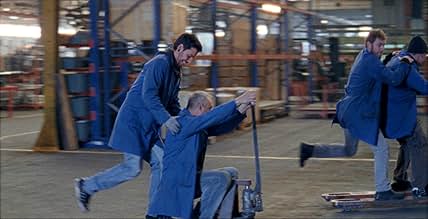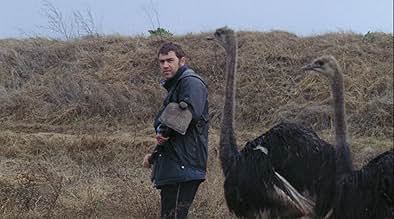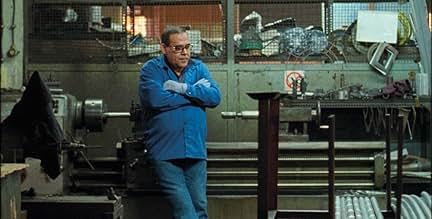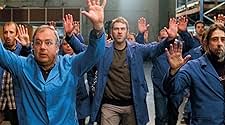Lorsque la direction se met à vendre les machines d'une usine qui fabrique des pièces pour ascenseur, les ouvriers s'inquiètent pour leurs emplois.Lorsque la direction se met à vendre les machines d'une usine qui fabrique des pièces pour ascenseur, les ouvriers s'inquiètent pour leurs emplois.Lorsque la direction se met à vendre les machines d'une usine qui fabrique des pièces pour ascenseur, les ouvriers s'inquiètent pour leurs emplois.
- Prix
- 19 victoires et 32 nominations au total
Histoire
Le saviez-vous
- Bandes originalesA Noite das Gárgulas
Written by Focolitus
Performed by Focolitus
Courtesy of C.A.G.A. Records
Under CC-BY-NC-SA 4.0 License
Commentaire en vedette
Portuguese filmmaker Pedro Pinho's THE NOTHING FACTORY takes home the FIPRESCI Prize in Cannes, with the jury's verdict as follows: "An evocative activist film that blows the boundaries between reality, fiction, theater and sociological discourse leading to an unsettling and provocative cinematic experience." but, it is an overstatement, because there is nothing unsettling and provocative in this meandering docu-drama, a hodgepodge of didactic, verbose theoretical discussions and workaday miserabilism perpetuating around a cohort of blue-collar workers who are saddled with a massive layoff.
Most courageously, the film offers its audience a fine-tooth combing of the downside of capitalism, and hammers home the inevitability of its failing which is behind the lift-manufacturing factory's dodgy maneuver, smuggling machines out in the night, so they can start anew in other places while ditching the current one with their labor surplus. But it suffers from being a typical talk-the- talk endeavor which to this reviewer's lights, is flogging a dead horse.
After negotiating with the shysters hired by the factory owner reaches a standstill, summarily, the workers are left with a half-empty factory and they decide to operate the business on their own despite that no one is equipped with the know-how of management. Anticlimactically, a seemingly propitious order from Argentina doesn't necessarily elicit the hardship-defying mettle which the story-line half-heartedly suggests, apart from an out-of-nowhere musical sequence, whose feigned elation comes a bit too late to dispel the dreadful tenor holding its stranglehold on this nearly 3-hour long realism-evoking overreach er.
Character-arc straggles unsystematic-ally, and what Pinho and his team actually excel is the atmospheric construct: a disconsolate Lisbon colored with invariably somber hue refracts Pinho's own personalistic rumination of the city and his compassion to his beleaguered subjects might not be immediately felt, because self-consciously he knows he is trying to tackle with something much bigger, but to little avail (it is not that a solution is a requisite, but Pinho's scattershot pieces simply do not cohere as a narrative feature). Just like the contrived materialization of a bevy of ostriches loping in the wilderness during the film's middle passage, he intends to speak for those ostracized, marginalized, underprivileged, but visionary illumination is in dire paucity.
Most courageously, the film offers its audience a fine-tooth combing of the downside of capitalism, and hammers home the inevitability of its failing which is behind the lift-manufacturing factory's dodgy maneuver, smuggling machines out in the night, so they can start anew in other places while ditching the current one with their labor surplus. But it suffers from being a typical talk-the- talk endeavor which to this reviewer's lights, is flogging a dead horse.
After negotiating with the shysters hired by the factory owner reaches a standstill, summarily, the workers are left with a half-empty factory and they decide to operate the business on their own despite that no one is equipped with the know-how of management. Anticlimactically, a seemingly propitious order from Argentina doesn't necessarily elicit the hardship-defying mettle which the story-line half-heartedly suggests, apart from an out-of-nowhere musical sequence, whose feigned elation comes a bit too late to dispel the dreadful tenor holding its stranglehold on this nearly 3-hour long realism-evoking overreach er.
Character-arc straggles unsystematic-ally, and what Pinho and his team actually excel is the atmospheric construct: a disconsolate Lisbon colored with invariably somber hue refracts Pinho's own personalistic rumination of the city and his compassion to his beleaguered subjects might not be immediately felt, because self-consciously he knows he is trying to tackle with something much bigger, but to little avail (it is not that a solution is a requisite, but Pinho's scattershot pieces simply do not cohere as a narrative feature). Just like the contrived materialization of a bevy of ostriches loping in the wilderness during the film's middle passage, he intends to speak for those ostracized, marginalized, underprivileged, but visionary illumination is in dire paucity.
- lasttimeisaw
- 10 nov. 2017
- Lien permanent
Meilleurs choix
Connectez-vous pour évaluer et surveiller les recommandations personnalisées
Détails
Box-office
- Brut – à l'échelle mondiale
- 42 657 $ US
- Durée2 heures 57 minutes
- Couleur
Contribuer à cette page
Suggérer une modification ou ajouter du contenu manquant

Lacune principale
By what name was A Fábrica de Nada (2017) officially released in Canada in English?
Répondre





